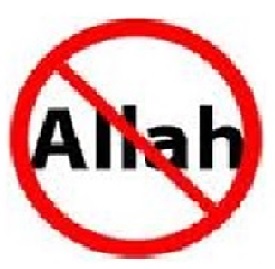 |
 |
The dispute between the Sabah-Sarawak churches and the government over the rights of Christians to use the “Allah” word in the Bahasa Malaysia Bible (Alkitab) has lasted more than 10 years. The Malaysian church leaders continue to reach out to government officials to find an amicable solution even as they await the judgment of the court in two cases where Sarawak and Sabah Christians sued the government for their right to use the word in the Alkitab.
The dispute has lasted so long that it no longer garners attention as front-page news. Not surprisingly, many young Christian leaders today fail to understand the fundamental concerns that compelled the church leaders to bring the dispute to court – the dispute over the “Allah” word would not have arisen if the Malaysian authorities acknowledge the undeniable historical fact that Christians in Malaysia who use the word are merely following the honorable tradition of Arabic Christians who have been using the word for centuries long before the advent of Islam. By prohibiting Christians from addressing their God as “Allah”, the Malaysian authorities are violating common sense and human courtesy.
Young Christian leaders will gain a full understanding of the right of Christians to use the “Allah” word after reading the Expert Report shared in this post. Such an understand is vital so that they will continue defend with firm conviction the right of Malaysian Christians to use “Allah” word in the Alkitab since the usage is historically legitimate, linguistically and theologically well-founded.
Excerpt from Expert Report submitted to the court in defending the rights of Christians to use the “Allah” word:
1. This Supplementary Report has been prepared on the instructions of solicitors for the Applicant in Application for Judicial Review Application No.R4(2)-25-256-2008 filed in the High Court of Malaya at Kuala Lumpur…
2. I have been asked to assist this Honourable Court with regard to the linguistic, historical and theological reasons for the views of contemporary commentators on the use of the word “Allâh” that have been used by Malay-speaking Christians for many generations to express their faith. The early Malay-speaking Christians were simply carrying on the tradition of their fellow Arab-speaking Christians who have been using the word Allâh and other Semitic terms in their Scripture and liturgy for centuries.
3. I have also been asked to comment on the Expert Reports pertaining to his case prepared by Dr. Mohd Sani Badron (“Dr. Mohd Sani”) and Prof. Madya Dr. Khadijah Mohd Khambali @ Hambali (“Prof. Khadijah”)…
F. CONCLUSION
152. Further to the conclusion in Part F of the First Report, the current court dispute over the “Allah” word would not have arisen if the Malaysian authorities acknowledge the undeniable historical fact that Christians in Malaysia who use the word are merely following the honorable tradition of Arabic Christians who have been using the word for centuries long before the advent of Islam. By prohibiting Christians from addressing their God as “Allah”, the Malaysian authorities are violating common sense and human courtesy. Indeed, the fact that the controversy and proposed ban is initiated by the ruling party for the purpose of gaining political mileage should not be lost to any objective observer.
153. Likewise, Muslim scholars should not presume to tell Christians how they should name their God. These scholars should respect the rights of people of different faiths to define their own faith, that is, how they address their God, describe His attributes and relate to him. Scholars like Dr. Mohd Sani and Prof. Khadijah have been quick to comment on and interfere with the faith and practice of Christianity not because they speak from expert knowledge in matters of translation, but because they illegitimately seek to impose a narrow linguistic perspective onto Christian believers. Their attempt to prohibit Christians from using “Allah” is premised on the demand that usage of “Allah” must conform to Islamic theology. This demand is unreasonable and inappropriate for the simple reason that the present dispute is not so much about the translation of the Quran as it is about the translation of the Bible.
154. It would be good for critics like Dr. Mohd Sani and Prof. Khadijah who evidently have no experience in cross cultural communication and translation of Holy Scriptures be humble instead of presuming to teach Christian translators who arguably represent the world’s most extensive and sophisticated expertise in the translation of Holy Scriptures. In particular, they should respect the Christian translation tradition in South East Asia which has for centuries consistently upheld that “Allah” is integral to the expression and practice of the Christian faith in the Malay language, as it has been the case for Arab Christians in the Middle East.
155. Prof. Khadijah argues that Christians should not be allowed to use “Allah” as this would bring confusion and undermine social harmony, “Jika penganut Kristian di bernarkan menggunakan kalima “Allah” menurut acuan permikiran dan falsafah ajaran Kristian, keamanan masyarakat Malaysia pasti akan tergugat dan ia akan menimbulkan pelbagai polemik dalam kalangan Islam dan bukan Islam. Justeru, adalah wajar dengan menggunakan kuasa siasah, Malaysia memantau permasalahan ini secara bijaksan” (para 37).
156. Prof. Khadijah expresses concerns that allowing Christians to use “Allah” could jeopardize social peace: keamanan masyarakat Malaysia pasti akan tergugat dan ia akan menimbulkan pelbagai polemik dalam kalangan Islam dan bukan Islam. Justeru, adalah wajar dengan menggunakan kuasa siasah, Malaysia memantau permasalahan ini secara bijaksan” (para 37).
157. Her concerns are premised on the assumption that only Muslims are using the word “Allah” correctly. As such, Christians should not be allowed to use “Allah”. However, her concerns are unfounded as the premise has been proven beyond doubt to be linguistically questionable and in conflict with historical facts.
158. It is true that there are both similarities and differences in how the Muslim and Christian communities interpret and understand “Allah”. Nevertheless, it is not helpful when Khadijah describes the situation in terms of “polemic.” This is a loaded word which suggests adopting an adversarial posture towards people outside of one’s faith and thus creating unnecessary anxieties and tension. In fact, the Christians are surprised and saddened to be told that they are being polemical when they use “Allah”. Truth be told, they are only following the customary usage inherited from their forebears when they use “Allah” in their worship, rituals and religious education. It is hoped that Khadijah would cease from imputing polemical motives to Christians and recognize the genuine desire of the Christians to practice their religion with peace and harmony with their fellow Muslim citizens.
159. Upholding religious peace and harmony requires Malaysian citizens to respect the right of every religious community to worship using the customary language of its long religious tradition. As “Allah” is integral to the faith and practice of the Christian community, religious freedom should include the right of the Christian community to use “Allah” without objection and interference from scholars like Dr. Mohd Sani and Prof. Khadijah. Their objection to Christians using “Allah” reflects an attempt to impose an Islamic understanding onto Christian religion and their suggestion to apply civil laws to prohibit Christians from using “Allah” amounts to a violation of the fundamental liberty and religious freedom of the Christian community.
160. Indeed, following the suggestion by Dr. Mohd. Sani and Prof. Khadijah would undermine the peace and harmony of the Malaysian society. In this regard, Dr. Mohd Sani and Prof. Khadijah should acknowledge that the provision in the Federal Constitutional for religious freedom is premised on the reality of differences in diverse religions in Malaysia. That is to say, our esteemed scholars should accept the right of Christians to use “Allah” out of respect to the Constitution which envisages Malaysian citizens to tolerate and respect religious differences as a way to maintain peace and harmony.
Date. 29 November 2017
You can read & download an excerpt of the Expert Report from the links given below
High Court KL Affidavit Christian Use Allah 29-11-2017
![]()  Download “Allah” in the Alkitab by Malay-Speaking Christians: Commentary and Rebuttals
 Download “Allah” in the Alkitab by Malay-Speaking Christians: Commentary and Rebuttals
Related Posts: Collated Resources: Christians from pre-Islam Arab Christians to Bumiputera Christians have the Right to Use Allah
Dear Dr. Kam-Weng, Shalom:
Your Expert inputs vis-a-vis the ‘Allah’ issue are deeply appreciated. May the LORD sustain and enhance even more your apologetic out-puts for the Bible/ the Gospel and Christian Faith in general in 2020 and many more years ahead, with equipping of many ‘disciples/murids’ in this respect. God abides, and stay connected.
KS
The authorities and Islamic agencies like Jakim derive their so called power to deny Malay speaking Christians their right to use the word “Allah” to refer to God from the Various state Islamic enactments over the years since 1980. These are not state laws but enacted under the Federal Constitution. These enactments are therefore ultra vires the Constitution in so fat as they subvert the constitutional provision for freedom of religion. The “Allah” prohibition has no place in a constitutional democracy like Malaysia.